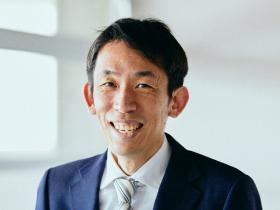Consumer law: Social infrastructure for supporting safety and security
Living in today’s society, every day we “consume” in one form or another. Everyone from a child buying candy to someone taking out a loan to buy a home is a consumer. That is why every period in our society has had its consumer issues, and consumer laws that were created to deal with them. Consumer law is closely related to everyone’s lives and society, so everyone can consider it as something that concerns them. Using that characteristic, Associate Professor Fukushima and his students consider the ideal state of a society in which consumers can live safely and securely.


Shigehiro Fukushima
Associate Professor, Department of Current Legal Studies, Faculty of Law
Graduated from Keio University, Faculty of Law, Department of Law. After working as an attorney at a Tokyo law firm, he was at Japan’s Consumer Affairs Agency before assuming his current position in April 2022. He worked at the Consumer Affairs Agency for about nine years as a fixed-term civil servant, overseeing the planning and drafting of consumer contract laws and other laws from the standpoint of a legal expert. His specialty is consumer law.
What can laws do for consumer safety and security?
I’m on the faculty of the Department of Current Legal Studies, where we investigate how we can use information (computer technology) to address real-world societal issues, such as those related to consumption and the environment. Although our studies focus on law, our education and research consider issues from multiple perspectives, without limiting ourselves to legal solutions. For example, we consider the policies and politics underlying those laws, as well as the natural sciences. My particular specialization is the field of consumer law, and my students and I conduct research under an overarching theme of what role the law should play in ensuring that consumers can live safely and securely.
The concept of consumer rights and laws for protecting those rights is said to have originated with the “Special Message to the Congress on Protecting the Consumer Interest,” presented by U.S. President John F. Kennedy in 1962. “Consumer law” refers not to a single law but a body of laws pertaining to consumers. Examples in Japan include the Basic Act on Consumer Policies, the Consumer Contract Act, the Act on Specified Commercial Transactions, the Act Against Unjustifiable Premiums and Misleading Representations, and the Installment Sales Act. My research interests of course include such existing laws, but also legislative theory that considers what kind of laws should exist, and policy theory regarding non-legislative solutions to consumer problems.
Every day of our lives, we consume something. Everyone from children to the elderly is a consumer, so everyone is subject to consumer problems. When thinking about how to best address consumer issues, we often see connections with our own lives. Being such a familiar issue, therefore, consumer issues are characterized by the fact that individual, personal values tend to emerge in the way people think, which I think makes it a very interesting field of study.

From the halls of government to a new world of academia
I became deeply involved in consumer issues and consumer law when I started working as a fixed-term government employee for the Consumer Affairs Agency. Most consumer laws were created to address some social issue that has arisen to the disadvantage of consumers. In that sense they are created somewhat “haphazardly,” but while overseeing the actual drafting of such laws at the Consumer Affairs Agency, I came to think that sense of real-time creation is what makes consumer law so interesting and appealing.
But on the other hand, I also realized that consumer law has a fairly short history, as compared to civil and criminal law, and that it developed in an ad hoc manner, and thus that it has been insufficiently researched as an academic field. Feeling a need to further develop academic research now so that we can ensure that good consumer laws will continue to be made in the future is the reason why I left the Consumer Affairs Agency and took this leap into the new world of academia.
The creation of a law is not the end of its story. Laws come to life when we, as users, understand and use them properly. As a lawmaker, I often felt the importance of educating those who would be using and supporting those laws. In that respect, I find great reward in my job as a university faculty member, someone who is responsible for educating young people.

The “New Act for Relief of Damage Caused by Fraudulent Spiritual Businesses” as a powerful drug
Having overseen consumer contract law for many years at the Consumer Affairs Agency, I currently conduct research and write articles on topics related to “transactions” (contracts). I recently wrote a paper focusing on issues such as the extent to which lessees (consumers) should be protected in rent guarantees for rental properties, and whether prior disclosure of terms and conditions is always required.
Every consumer problem has a social context from which that problem arose, and in many cases there are laws that address that problem, albeit perhaps inadequately. For example, one consumer issue that has attracted a lot of attention in Japanese society today is the business of selling “spiritual” products. This issue came into focus with last year’s assassination of former Prime Minister Abe, one result of which was the Diet passing a new law (the Act on the Prevention of Malicious Donation Solicitations by Organizations) in December 2022 to provide damage relief.
I believe there are two main patterns for the sale of spiritual products. One is sales made under duress, in which the seller uses spirituality to create a sense of fear that scares people into buying goods or services. The other type takes advantage of worries, complexes, or other personal weaknesses to sway the target’s personality toward immersion in a particular religion and subsequently making large voluntary donations. This pattern differs from the coercive type in that it distorts fundamental human personalities, so I call it the “personality destruction” type. Existing consumer contract law could handle the coercive type but was inadequate to cope with the damage that the personality-destruction type can cause. That is the context in which finding some way to handle the damage that the personality-destruction type can cause became a social issue, triggered by the shooting of Abe.
The new law stipulates that when soliciting donations, corporations and other entities must “not suppress free will and make it difficult for donors to make appropriate decisions” and “ensure that donations will not make it difficult for donors to maintain their livelihood.” It also stipulates that violating those duties will be subject to penalties. I believe that by establishing such duties the new law will be quite effective in preventing personality-destruction-type damage, but I fear it may also be a powerful drug that induces significant side effects.
The new law targets “corporations, etc.” This includes not only religious corporations, which is what most people associate with the sale of spiritual products, but also NPOs. Therefore, for example charitable organizations now have a duty to be careful when solicitating donations on the street, which may have a negative impact on honest activities, causing them to atrophy and be suppressed.
This new law has a provision for its review approximately two years after its implementation. We therefore have two years to carefully assess both its “efficacy” and its “side effects” in consideration of what its final form should be. There are many aspects for awareness of how the new law is inadequate as a countermeasure against spiritual product sales, and for that reason, I believe we must examine it from various angles, side effects included.

Deep dives into consumer law based on students’ own awareness of issues
University seminars and classes are directly related to academic research, and I believe that this is the main difference between university studies and how we learn through high school. Whenever I’m writing a paper, I try to cover its topic in classes or exercises so I can discuss it with my students. Because they are the topic of an academic paper, the issues involved are often quite complex, but discussing them with students helps me organize my thoughts and gain a broader perspective. When going back to work on my paper, I recall the faces of the students who spoke up in class. That makes me truly happy and glad to have become a university instructor.
In my seminars, I ask students to research and present on a topic of their choice. Many students combine stories they heard about in their consumer law classes with their own experiences to delve deeper into the topic, and their presentations focus on various issues. Past presentations have covered fraudulent Amazon reviews, crypto assets, and “breakup facilitators.” My students’ interesting presentations always greatly inspire me, because they all connect their own sense of the issue with consumer law. One of the most memorable was a student presentation about the issue of food loss.
Japan enacted the Act on Promotion of Food Loss and Waste Reduction in 2019, with the Consumer Affairs Agency as the ministry in charge of its implementation. However, I was skeptical about addressing food loss issues from the domain of consumer law. I felt that because, while consumer law focuses on ensuring consumer safety and security, some efforts toward reducing food loss would restrict consumer behavior. One example is the promotion of temaedori, the practice of selecting those products nearest their expiration dates when shopping at supermarkets.
I discussed this question in my seminar, and a short time later one of my students gave a presentation, using that student’s experience working part-time at a supermarket to concretely and passionately explain why food loss is an issue that consumer law should address. I was impressed and very happy to see that student not simply accepting everything I said, but rather questioning the things I said, sincerely thinking about them, and boldly presenting their differing opinion.
 Materials created by seminar students.
Materials created by seminar students.The appeal of the Department of Current Legal Studies
Generally speaking, one imagines legal studies to be about laws first and foremost, with students working to understand and memorize them. However, the Department of Current Legal Studies takes a different approach. As a starting point, we consider issues confronting today’s society, such as consumption and the environment, and we learn how to apply the law as a tool for problem-solving while also utilizing information. As I mentioned at the beginning, this is why law is the focus of our studies, but we also broaden our perspectives and work in areas outside of legal studies as needed. An interesting and attractive aspect of our Department is the free and spontaneous atmosphere created by faculty and students who do not restrict themselves to legal issues, so long as they can otherwise fulfill their problem-solving objectives. I hope that many people will come to study in our Department.
Consumer laws aim to create a world where all consumers can live safely and securely. Like electricity and gas, consumer laws are infrastructure supporting our lives, and they must be constantly reviewed to keep pace with social change. It is also important for consumers to understand and be able to skillfully use consumer laws. By researching and providing education of consumer law, we hope to continue contributing however we can to the realization of a society in which consumers can live safely and securely.

